#NNPA BlackPress
BLERD BINDER: Racebending in live action adaptations.
NNPA NEWSWIRE — In this article, we will talk about Zoe Kravitz’s casting, times when racebent casting was awesome, times when racebent casting failed, why it is an important conversation to have, and how it affects the audience and fans.
“Holy Cow Batman! Aquaman is Catwoman’s stepfather!!!”
Blurb: The Blerd Binder covers nerdy news for the Black nerds of the world. We welcome all as we talk about subjects ranging from Movies to Music and Tech to Toys. Today, we will talk about racebent casting in the movie industry.
By Noah Washington, NNPA Newswire Contributor
HOLY COW! Last week, a historic moment happened in Nerd Culture: the casting of Catwoman for director Matt Reeves The Batman.
As far as Blerd Culture is concerned, the casting of Zoe Kravitz (Aquaman, Jason Moama’s stepdaughter) as Catwoman is big news on a number of different levels.
Racebending of fictional characters (changing of a character’s perceived race or ethnicity during the adaptation of a work from one medium to another) has become a hot topic in today’s age of comic book renaissance.
Sometimes, it heavily divides fans. Sometimes, it has fans screaming for joy. Sometimes, nobody cares. But each time the decision is met with commentary.
In this article, we will talk about Zoe Kravitz’s casting, times when racebent casting was awesome, times when racebent casting failed, why it is an important conversation to have, and how it affects the audience and fans.
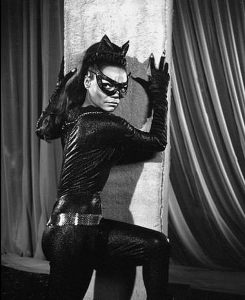 Zoe Kravitz’s Catwoman casting brings me a feeling of nostalgia as I can’t help but think of Eartha Kitt’s turn as Catwoman from the Batman ‘66 show. Based on what Matt Reeves has said about his interpretation of Batman and his surrounding characters, the film will be a story that harkens back to the Dark Knight’s detective roots.
Zoe Kravitz’s Catwoman casting brings me a feeling of nostalgia as I can’t help but think of Eartha Kitt’s turn as Catwoman from the Batman ‘66 show. Based on what Matt Reeves has said about his interpretation of Batman and his surrounding characters, the film will be a story that harkens back to the Dark Knight’s detective roots.
Kitt was one of the earliest actors who racebent a character when she took over the role from White actress Julie Newmar in the third season of the iconic TV show. The casting change was reportedly made because Newmar was filming another movie at the time.
It’s worth noting that Kitt was one of the most recognizable actors to appear the role during the show’s run. Her personification of the character is as close to perfect and unique as she could have gotten without literally plucking the illustrated character from the pages of a comic book.
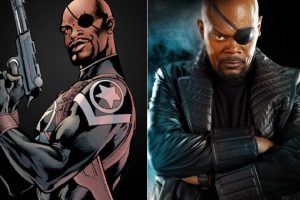 Another example of racebending was Marvel’s casting of Samuel L. Jackson as Nick Fury, even though the race of the character has already been changed in the comics before Jackson was even cast.
Another example of racebending was Marvel’s casting of Samuel L. Jackson as Nick Fury, even though the race of the character has already been changed in the comics before Jackson was even cast.
According to the site, comicbook.com, “I still buy comic books, so I go to this store in L.A., Golden Apple, and I was in there one day and I’m passing the rack and I see this thing, The Ultimates, and I go, ‘Wow, it looks like me,'” Jackson recalled. “So I started looking, and it’s like, Nick Fury looks just like me, and I’m reading, and he goes, ‘Well, if they make a movie about us, who do you want to play you?’ and Nick Fury goes, ‘Samuel L. Jackson.’ I go, ‘I didn’t give anybody my permission to use my image in a comic book.'”
Jackson goes on to explain that, after calling his agent and explaining how and where he discovered his likeness in a comic book, “She said, ‘Let me call somebody,'” the actor shared. “So she calls Marvel and they say, ‘Well, we are thinking about making these movies and, hopefully, if we make them, he would play Nick Fury.’ I’m like, ‘For real?'”
When the news of Jackson being cast was revealed to the public, the internet went into a frenzy. However, after more than 10 years of playing the character, Nick Fury has become indelibly associated with Mr. Jackson.
Eartha Kitt and Samuel L. Jackson are just two examples of how racebending a character with the right actor can deliver amazing results for a television show or feature film.
These two performances were met with the type of acclaim and mainstream success that is indicative of blockbuster hits. Not because they look different from the original presentations of the characters they portrayed, but because they were the right actors to embody the characters transition from 2D comics to television and film.
However, Kitt and Jackson’s success hasn’t changed the underlying controversy and question: Why not just create new diverse characters?
While purists may always have issues with new interpretations of legendary characters, there’s often a business reason driving the decision to change an existing character instead of developing new characters with a focus on diversity.
At a time when comic book properties are seemingly optioned for television, film and theater projects on a weekly basis, the reason that producers and others don’t just go and make new characters is a matter of economics: Financing these projects is expensive, and to ensure adequate return on investment, the most popular characters with highest consumer awareness are usually chosen as the centerpiece of the show or film franchise.
Some existing characters are so popular that it’s almost be impossible to develop a new character with any reasonable hope of achieving a similarly high level of popularity without significant investment.
Investing to make a completely new character popular enough to be a box office draw, just to cast an actor of color in a role, when there is an existing character that is perfect for the story, makes no sense. Especially since, in many cases, the goal is to find the best actor for the role and, frequently, an actor of color is cast that perfectly embodies role.
Of course, there are times when a racebending isn’t only controversial, it’s also wrong. I am talking about in cases of White Washing, where instead of replacing a white character with a minority actor, a minority character is played by a white actor.
I have two very good examples of this.
A significant portion of the cast of M.Night Shyamalan’s The Last Airbender, and the controversial casting of Tilda Swinton as the ‘Ancient One’ in Marvel’s Doctor Strange.
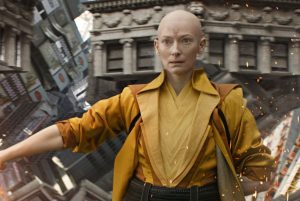 I’ll start with Doctor Strange. I do not have any problem with Swinton’s performance as The Ancient One. I thought the spin on the character was alright, but I did not appreciate the opportunity it took away from casting an Asian actor who could have been the live-action representation.
I’ll start with Doctor Strange. I do not have any problem with Swinton’s performance as The Ancient One. I thought the spin on the character was alright, but I did not appreciate the opportunity it took away from casting an Asian actor who could have been the live-action representation.
This signals a problem because most of the time, in fantasy films where magic is involved, the mystical and powerful elder has always been an old White man. I know that Swinton as a woman, is also a minority, so that is a plus, but what does this say to other minorities? Can only elderly White men hold great power and wisdom?
I love Dumbledore from Harry Potter, The Doctor from Doctor Who, Gandalf from Lord of The Rings, and Professor X from X-Men. But there comes a point when all of these characters tend to blend together. You need diverse casting, like in the case of Djimon Hounsou as “The Wizard Shazam” from Shazam to keep things interesting.
And now that most dreaded moment when the entire collective nerd community cringes: Whenever The Last Airbender is brought up in conversation.
![]() Nearly all of the anime’s/cartoon’s superb characters — heavily based in Asian culture — were replaced with White actors that did not represent those original characters in characteristics, appearance, or even name.
Nearly all of the anime’s/cartoon’s superb characters — heavily based in Asian culture — were replaced with White actors that did not represent those original characters in characteristics, appearance, or even name.
When none of these qualities are present, then they might as well be new characters. This was one case of racebent casting that served no purpose and is insulting to the original material, the creators and the fans that truly love Avatar: The Last Airbender.
 This is an issue that shouldn’t be happening in the 21st century. Scarlett Johannson’s casting in Ghost in the Shell should never have happened. I understand that actors should be able to do what they were hired to do and “act.” but some roles were not meant for certain people. We have to be inclusive of the actors that might not be able to find work outside of the roles that are in their perceived purview.
This is an issue that shouldn’t be happening in the 21st century. Scarlett Johannson’s casting in Ghost in the Shell should never have happened. I understand that actors should be able to do what they were hired to do and “act.” but some roles were not meant for certain people. We have to be inclusive of the actors that might not be able to find work outside of the roles that are in their perceived purview.
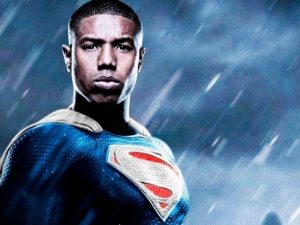 One of the most iconic rumors that ended with rage and fury is when Micheal B.Jordan was rumored to be cast as Superman after Henry Cavill supposedly left the role (these are just internet rumors that have not been made official by DC or Warner Bros).
One of the most iconic rumors that ended with rage and fury is when Micheal B.Jordan was rumored to be cast as Superman after Henry Cavill supposedly left the role (these are just internet rumors that have not been made official by DC or Warner Bros).
The internet broke out in such a frenzy that somebody would have thought the world had ended. Numerous online fans said, “Superman can’t be Black.”
All I have to say to that is that Superman has had a history where he indeed was Black so it’s not a stretch to say that one day, we may see a live action adaptation. Calvin Ellis was a black Superman modeled after Barack Obama from the comics, as well as more recently, Val-Zod, who was created in 2014.
On the other side of things, there are times where storyline and lore of the original source material would truly stop a character’s race from being changed. One of the most notable examples is the iconic character, Bruce Wayne.
The Wayne family is said to have had a hand in bringing Gotham City to life and had wealth going back generations as early as the 1700s in America. It would be very hard for an audience to believe that an African American had Wayne family wealth in the 1700s during the period of slavery. That doesn’t mean that Batman can’t be black, but that Bruce Wayne shouldn’t be black.
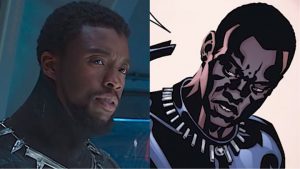 There is also the old argument that “if you make a character who was already White suddenly Black, why can’t Black Panther be White?” I will happily give you the answer to that question. Some character’s lore and location make the character who they are. T’Challa, the Black Panther, is an African King who is native-born and, similar to the case with Bruce Wayne, it would be very hard to write that character as any other race.
There is also the old argument that “if you make a character who was already White suddenly Black, why can’t Black Panther be White?” I will happily give you the answer to that question. Some character’s lore and location make the character who they are. T’Challa, the Black Panther, is an African King who is native-born and, similar to the case with Bruce Wayne, it would be very hard to write that character as any other race.
We should save our criticism of racebent casting to situations where the casting excludes marginalized groups that would not have been represented otherwise.
We in nerd culture tend to make judgments before we see the final product. Good or bad, casting choices usually come down to the ability of the actors cast in the role and how they well they embody the interpretation of the character the director envisions.
This is an important discussion as we should just allow these actors to show us their interpretation of these iconic characters before we make judgments. But we also need to have cultural awareness so that we know when a culture is taken advantage of or appropriated, as is too often the case with white washing.
I hope that you keep this in mind the next time you watch a TV show or movie where a familiar character looks a little different. Remember, this is about who the younger generation can look up to with pride and see themselves in.
We now live in an age where superhero Films and TV shows are released in droves. There is plenty of room at the table for everyone to feel welcomed.
#NNPA BlackPress
A Nation in Freefall While the Powerful Feast: Trump Calls Affordability a ‘Con Job’
BLACKPRESSUSA NEWSWIRE — There are seasons in this country when the struggle of ordinary Americans is not merely a condition but a kind of weather that settles over everything.

By Stacy M. Brown
Black Press USA Senior National Correspondent
There are seasons in this country when the struggle of ordinary Americans is not merely a condition but a kind of weather that settles over everything. It enters the grocery aisle, the overdue bill, the rent notice, and the long nights spent calculating how to get through the next week. The latest numbers show that this season has not passed. It has deepened.
Private employers cut 32,000 jobs in November, according to ADP. Because the nation has been hemorrhaging jobs since President Trump took office, the administration has halted publishing the traditional monthly report. The ADP report revealed that small businesses suffered the heaviest losses. Establishments with fewer than 50 workers shed 120,000 positions, including 74,000 from companies with 20 to 49 workers. Larger firms added 90,000 jobs, widening the split between those rising and those falling.
Meanwhile, wealth continues to climb for the few who already possess most of it. Federal Reserve data shows the top 1 percent now holds $52 trillion. The top 10 percent added $5 trillion in the second quarter alone. The bottom half gained only 6 percent over the past year, a number so small it fades beside the towering fortunes above it.
“Less educated and poorer people tend to make worse mistakes,” John Campbell said to CBS News, while noting that the complexity of the system leaves many families lost before they even begin. Campbell, a Harvard University economist and coauthor of a book examining the country’s broken personal finance structure, pointed to a system built to confuse and punish those who lack time, training, or access.
“Creditors are just breathing down their necks,” Carol Fox told Bloomberg News, while noting that rising borrowing costs, shrinking consumer spending, and trade battles under the current administration have left owners desperate. Fox serves as a court-appointed Subchapter V trustee in Southern Florida and has watched the crisis unfold case by case.
During a cabinet meeting on Tuesday, Trump told those present that affordability “doesn’t mean anything to anybody.” He added that Democrats created a “con job” to mislead the public.
However, more than $30 million in taxpayer funds reportedly have supported his golf travel. Reports show Kristi Noem and FBI Director Kash Patel have also made extensive use of private jets through government and political networks. The administration approved a $40 billion bailout of Argentina. The president’s wealthy donors recently gathered for a dinner celebrating his planned $300 million White House ballroom.
During an appearance on CNBC, Mark Zandi, an economist, warned that the country could face serious economic threats. “We have learned that people make many mistakes,” Campbell added. “And particularly, sadly, less educated and poorer people tend to make worse mistakes.”
#NNPA BlackPress
The Numbers Behind the Myth of the Hundred Million Dollar Contract
BLACKPRESSUSA NEWSWIRE — Odell Beckham Jr. did not spark controversy on purpose. He sat on The Pivot Podcast and tried to explain the math behind a deal that looks limitless from the outside but shrinks fast once the system takes its cut.

By Stacy M. Brown
Black Press USA Senior National Correspondent
Odell Beckham Jr. did not spark controversy on purpose. He sat on The Pivot Podcast and tried to explain the math behind a deal that looks limitless from the outside but shrinks fast once the system takes its cut. He looked into the camera and tried to offer a truth most fans never hear. “You give somebody a five-year $100 million contract, right? What is it really? It is five years for sixty. You are getting taxed. Do the math. That is twelve million a year that you have to spend, use, save, invest, flaunt,” said Beckham. He added that buying a car, buying his mother a house, and covering the costs of life all chip away at what people assume lasts forever.
The reaction was instant. Many heard entitlement. Many heard a millionaire complaining. What they missed was a glimpse into a professional world built on big numbers up front and a quiet erasing of those numbers behind the scenes.
The tax data in Beckham’s world is not speculation. SmartAsset’s research shows that top NFL players often lose close to half their income to federal taxes, state taxes, and local taxes. The analysis explains that athletes in California face a state rate of 13.3 percent and that players are also taxed in every state where they play road games, a structure widely known as the jock tax. For many players, that means filing up to ten separate returns and facing a combined tax burden that reaches or exceeds 50 percent.
A look across the league paints the same picture. The research lists star players in New York, Philadelphia, Chicago, Detroit, and Cleveland, all giving up between 43 and 47 percent of their football income before they ever touch a dollar. Star quarterback Phillip Rivers, at one point, was projected to lose half of his playing income to taxes alone.
A second financial breakdown from MGO CPA shows that the problem does not only affect the highest earners. A $1 million salary falls to about $529,000 after federal taxes, state and city taxes, an agent fee, and a contract deduction. According to that analysis, professional athletes typically take home around half of their contract value, and that is before rent, meals, training, travel, and support obligations are counted.
The structure of professional sports contracts adds another layer. A study of major deals across MLB, the NBA, and the NFL notes that long-term agreements lose value over time because the dollar today has more power than the dollar paid in the future. Even the largest deals shrink once adjusted for time. The study explains that contract size alone does not guarantee financial success and that structure and timing play a crucial role in a player’s long-term outcomes.
Beckham has also faced headlines claiming he is “on the brink of bankruptcy despite earning over one hundred million” in his career. Those reports repeated his statement that “after taxes, it is only sixty million” and captured the disbelief from fans who could not understand how money at that level could ever tighten.
Other reactions lacked nuance. One article wrote that no one could relate to any struggle on eight million dollars a year. Another described his approach as “the definition of a new-money move” and argued that it signaled poor financial choices and inflated spending.
But the underlying truth reaches far beyond Beckham. Professional athletes enter sudden wealth without preparation. They carry the weight of family support. They navigate teams, agents, advisors, and expectations from every direction. Their earning window is brief. Their career can end in a moment. Their income is fragmented, taxed, and carved up before the public ever sees the real number.
The math is unflinching. Twenty million dollars becomes something closer to $8 million after federal taxes, state taxes, jock taxes, agent fees, training costs, and family responsibilities. Over five years, that is about $40 million of real, spendable income. It is transformative money, but not infinite. Not guaranteed. Not protected.
Beckham offered a question at the heart of this entire debate. “Can you make that last forever?”
#NNPA BlackPress
FBI Report Warns of Fear, Paralysis, And Political Turmoil Under Director Kash Patel
BLACKPRESSUSA NEWSWIRE — Six months into Kash Patel’s tenure as Director of the Federal Bureau of Investigation, a newly compiled internal report from a national alliance of retired and active-duty FBI agents and analysts delivers a stark warning about what the Bureau has become under his leadership.

Six months into Kash Patel’s tenure as Director of the Federal Bureau of Investigation, a newly compiled internal report from a national alliance of retired and active-duty FBI agents and analysts delivers a stark warning about what the Bureau has become under his leadership. The 115-page document, submitted to Congress this month, is built entirely on verified reporting from inside field offices across the country and paints a picture of an agency gripped by fear, divided by ideology, and drifting without direction.
The report’s authors write that they launched their inquiry after receiving troubling accounts from inside the Bureau only four months into Patel’s tenure. They describe their goal as a pulse check on whether the ninth FBI director was reforming the Bureau or destabilizing it. Their conclusion: the preliminary findings were discouraging.
Reports Describe Widespread Internal Distrust and Open Hostility Toward President Trump
Sources across the country told investigators that a large number of FBI employees openly express hostility toward President Donald Trump. One source reported seeing an “increasing number of FBI Special Agents who dislike the President,” adding that these employees were exhibiting what they called “TDS” and had lost “their ability to think critically about an issue and distinguish fact from fiction.” Another source described employees making off-color comments about the administration during office conversations.
The sentiment reportedly extends beyond domestic lines. Law enforcement and intelligence partners in allied countries have privately expressed fear that the Trump administration could damage long-term international cooperation according to a sub-source who reported those concerns directly to investigators.
Pardon Backlash and Fear of Retaliation
The President’s January 20 pardons of individuals convicted for their roles in the January 6 attack ignited what the report calls demoralization inside the Bureau. One FBI employee said they were “demoralized” that individuals “rightfully convicted” were pardoned and feared that some of those individuals or their supporters might target them or their family for carrying out their duties. Another source described widespread anger that lists of personnel who worked on January 6 investigations had been provided to the Justice Department for review, noting that agents “were just following orders” and now worry those lists could leak publicly.
Morale In Decline
Morale among FBI employees appears to be sinking fast. There were a few scattered positive notes, but the weight of the reporting describes morale as low, bad, or terrible. Agents with more than a decade of service told investigators they feel marginalized or ignored. Some are counting the days until they can retire. One even uses a countdown app on their phone.
Culture Of Fear
Layered over that unhappiness is something far more corrosive. A culture of fear. Sources say Patel, though personable, created mistrust from the start because of harsh remarks he made about the FBI before taking office. Agents took those comments personally. They now work in an atmosphere where employees keep their heads down and speak carefully. Managers wait for directions because they are afraid a wrong move could cost them their jobs. One source said agents dread coming to work because nobody knows who will be reassigned or fired next.
Leadership Concerns
The report also paints a picture of leaders unprepared for the jobs they hold. Multiple sources said Patel is in over his head and lacks the breadth of experience required to understand the Bureau’s complex programs. Some said Deputy Director Dan Bongino should never have been appointed because the role requires deep institutional knowledge of FBI operations. A sub-source recounted Bongino telling employees during a field office visit that “the truth is for chumps.” Employees who heard it were stunned and offended.
Social Media and Communication Breakdowns
Communication inside the Bureau has become another source of frustration. Sources said Patel and Bongino spend too much time posting on social media and not enough time communicating with employees in clear and official ways. Several told investigators they learn more about FBI operations from tweets than from internal channels.
ICE Assignments Raise Alarm
Nothing has sparked more frustration inside the FBI than the orders requiring agents to assist Immigration and Customs Enforcement. The reporting shows widespread resentment and fear over these assignments. Agents say they have little training in immigration law and were ordered into operations without proper planning. Some said they were put in tactically unsafe positions. They also warned that being pulled away from counterterrorism and counterintelligence investigations threatens national security. One sub-source asked, “If we’re not working CT and CI, then who is?”
DEI Program Removal
Even the future of diversity programs became a point of division. Some agents praised Patel’s removal of DEI initiatives. Others said the old system left them afraid to speak honestly because they worried about being labeled racist. The reporting shows a deep and unresolved conflict over whether DEI strengthened the organization or weakened it.
Notable Incidents
The document also details several incidents that have become part of FBI lore. Patel ordered all employees to remove pronouns and personal messages from their email signatures yet used the number nine in his own. Agents laughed at what they saw as hypocrisy. In another episode, FBI employees who discussed Patel’s request for an FBI-issued firearm were ordered to take polygraph examinations, which one respected source described as punitive. And in Utah, Patel refused to exit a plane without a medium-sized FBI raid jacket. A team scrambled to find one and finally secured a female agent’s jacket. Patel still refused to step out until patches were added. SWAT members removed patches from their own uniforms to satisfy the demand.
A Bureau at a Crossroad
The Alliance warns that the Bureau stands at a difficult crossroads. They write that the FBI faces some of the most daunting challenges in its history. But even in despair, a few voices say something different. One veteran source said “It is early, but most can see the mission is now the priority. Case work and threats are the focus again. Reform is headed in the right direction.”
-

 Activism4 weeks ago
Activism4 weeks agoDesmond Gumbs — Visionary Founder, Mentor, and Builder of Opportunity
-

 Activism4 weeks ago
Activism4 weeks agoFamilies Across the U.S. Are Facing an ‘Affordability Crisis,’ Says United Way Bay Area
-

 Alameda County4 weeks ago
Alameda County4 weeks agoOakland Council Expands Citywide Security Cameras Despite Major Opposition
-

 Alameda County4 weeks ago
Alameda County4 weeks agoBling It On: Holiday Lights Brighten Dark Nights All Around the Bay
-

 Activism4 weeks ago
Activism4 weeks agoOakland Post: Week of December 17 – 23, 2025
-

 Activism4 weeks ago
Activism4 weeks agoBlack Arts Movement Business District Named New Cultural District in California
-

 Activism4 weeks ago
Activism4 weeks agoLu Lu’s House is Not Just Toying Around with the Community
-
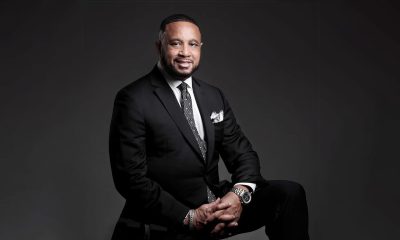
 Activism1 week ago
Activism1 week agoOP-ED: AB 1349 Puts Corporate Power Over Community

















































